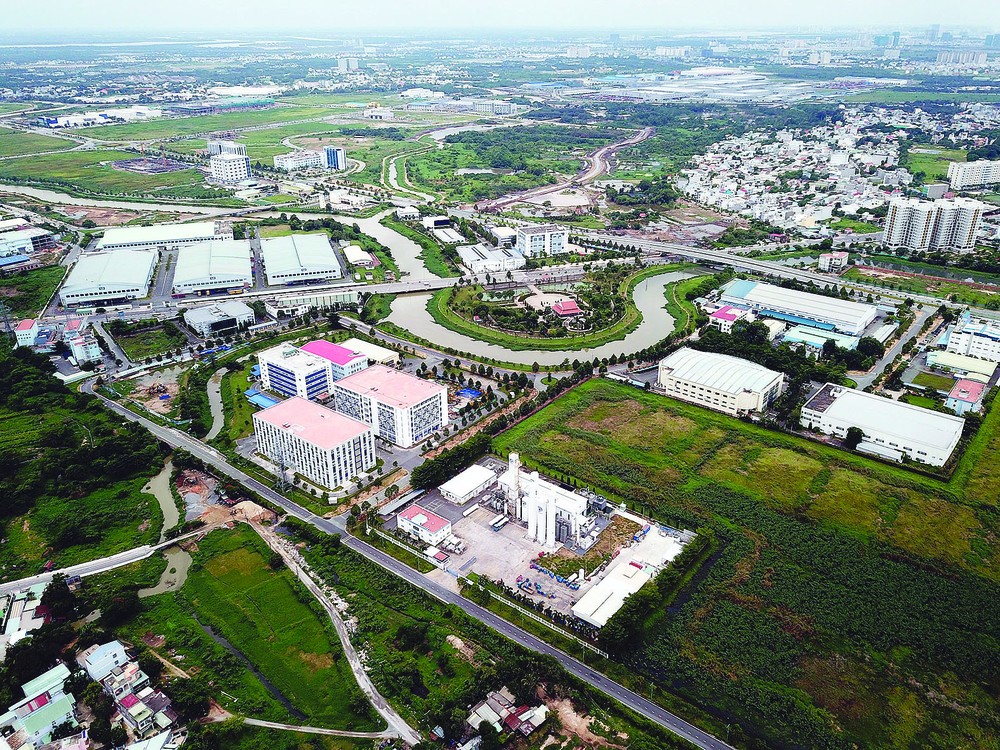
Reporter of Sai Gon Giai Phong (SGGP) Newspaper noted ideas and solutions of leaders and experts around this content.
According to Mr. Nguyen Manh Hung, Minister of Ministry of Information and Communications, digital transformation opens great opportunities for Vietnam.

Minister of Ministry of Information and Communications
Digital transformation heading to digital economy and digital society are the best environment for innovation. Digital transformation has actually accelerated with the appearance of technologies in the fourth industrial revolution.
Digital transformation is also known as cyber environment or a new environment in life called digital environment which is also a new challenge, opportunities, awareness, laws, ways of production and infrastructure.
Digital transformation is a great revolution of mankind; and this is the first time that mankind has entered another world. It will form new relationships, which will be the biggest challenge of digital transformation. However, new relationships and economic models will promote the efficiency of digital transformation.
The acceptance of the new things depends on change of human consciousness but it is the advantage for the countries that follow it because this cognitive transformation does not depend on the facilities owned by a country.
The followed countries are less burdened by the past, both in terms of material infrastructure and institutions, and in terms of the competitiveness of the second and third industrial revolutions. Still these past burdens could be an obstacle for the fourth industrial revolution because the 4.0 industrial revolution needs new competitiveness, new infrastructure and new institutions. If there is an appropriate policy, Vietnam will take this opportunity to become a developed country.
Digital transformation is a revolutionary policy and institution rather than a technological revolution, opening up enormous opportunities for Vietnam, and being also a comprehensive change to every business, organization, person and every field.
The advantage of Vietnamese people is the ability to quickly adapt to the new things, to be eager to learn new things, to be creative in applying new things. Vietnam has always been a strong country in the whole people revolutions.
Doctor Lucy Cameron from the Australian National Science Organization said that Vietnam has appropriate position to promote digital economy.

Vietnam is one of the fastest growing economies in the world and has become one of the most dynamic countries in East Asia.
The next wave of digital technologies such as artificial intelligence (AI), block-chain, Internet of Things (IoT), platform-based services and cloud computing, etc has potentialities to transform Vietnam into Asia's next high-performing economy so Vietnam needs to catch these great opportunities and limit some risks.
Currently, Vietnam has an appropriate position to promote the digital economy. Digital transformation will account for 1.1 percent of GDP growth per year for Vietnam until 2045.
Vietnam's growth is quite fast, comprehensive, only after China and has the appropriate foundation to convert into digital. Like many countries, Vietnam faces challenges of climate change, a slowdown in labor productivity and necessary resources.
Vietnam has achieved a low-middle-income country status, while many countries have been trapped in middle-income status due to lack of innovation and growth sources.
For high-income, fast-growing economies such as Singapore, South Korea, Hong Kong (China), etc., have made a breakthrough by investing in science and technology. Vietnam has many similarities with these countries and territories.
In order to become an "Asian tiger" and achieve high income, Vietnam needs to obtain high growth in exports and structural transformation, fast and comprehensive growth; catch up with technology; apply science and technology and improve productivity; maintain stable and reliable policy system; attach special importance to investment in health and education, etc.
The country has a great opportunity to take advantage of digital technology to make turning points in the coming time thanks to its young labor force. The central position of the region is also a great advantage and if there is great orientation, Vietnam can achieve its ambitions.
In the meantime, Doctor Tran Hoang Ngan highlighted the need of stale law systems for investors to set their minds at rest to do business in Vietnam.

Vietnam have spent very high growth years in the period of 1992-1997, when the financial crisis in Southeast Asia in 1997 had not happened, Vietnam's economic growth reached from 8.5 percent to 9.5 percent per year; in the period of 2002-2007 before the world financial crisis in 2008, Vietnam's economy also grew by 7.5 percent to 8 percent a year. Therefore, Vietnam's growth momentum of over seven percent year is normal.
Hard-working human resources and political determination of the whole system based on stable macroeconomic background are the basic factors to promote economic growth in 2020.
In addition, the Government has improved business investment environment, there are resolutions for the private sector to attract capital from private enterprises in the country.
At the same time, investment capital from abroad will still pour to Vietnam, and the Southeast Asian country will still be an attractive destination for foreign investors.
In addition to the restructuring of state-owned enterprises (SOEs), these areas will create a common driving force for economic growth.
The speed of using the internet and the increase in using the social network by many Vietnamese people will help the digital economy grow rapidly.
In the current context, the private sector is still the driving force of the economy. It is necessary to continue SOE restructuring and equitization in areas where the private sector can develop. That can enhance the performance of SOEs and facilitates the continued development of the private sector.
The foreign investment capital is expected to flow into Vietnam in the coming years. It is necessary to pay attention to environmental protection and prevent worsening environmental pollution.
It’s important to avoid incidents similar to Formosa because with attracting foreign investment, environmental protection issues must still be on top priority.
The important matter now is bettering the business environment.
In 2019, the global competitiveness index (GCI) of Vietnam rose to the 67th position, up 10 places, which is a great effort. But Vietnam still needs perseverance, continues to improve more strongly, especially the legal system needs to ensure stability which would make investors assured.
Sharing with SGGP Newspaper’s reporter, former President of Central Institute for Economic Management Nguyen Dinh Cung said that Vietnam needs to continue improving investment environment.

Nguyen Dinh Cung
Among ASEAN countries, Singapore has maintained in the second stable position since 2016; Malaysia has increased 12 levels over the past two years; Thailand increased by six places in 2019; the Philippines increased 29 places, etc, and Vietnam ranked the fifth after Singapore, Malaysia, Thailand and Brunei.
The above results show that the business environment reform in Vietnam tends to slow down; therefore, it is required to continue to actively improve the business environment and enhance national competitiveness to successfully achieve the objectives and tasks of the annual socio-economic development plan of 2020 according to a resolution of the National Assembly.
























